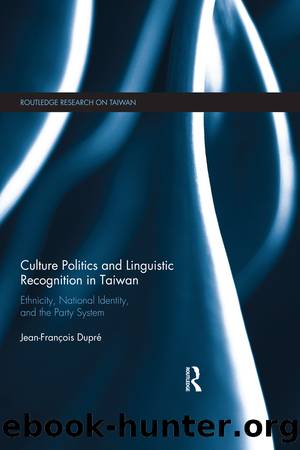Culture Politics and Linguistic Recognition in Taiwan: Ethnicity, National Identity, and the Party System by Jean-Francois Dupre

Author:Jean-Francois Dupre [Dupre, Jean-Francois]
Language: eng
Format: epub
Tags: Ethnic Studies, Social Science, Political Science, Regional Studies, General
ISBN: 9781317244202
Google: szMlDwAAQBAJ
Goodreads: 34410559
Publisher: Routledge
Published: 2017-02-24T00:00:00+00:00
Notes
1 Sociolinguists tend to be sceptical about self-reports on language use and attitudes, and are therefore suspicious about data obtained from large-N surveys. The findings presented in this chapter are, however, largely in line with the general consensus reached in the academic literature on Taiwanese sociolinguistics, and with my own observations while conducting fieldwork.
2 This chapter suggests that language may reinforce ethnic identity to a certain extent, though ethnicity appears to be primarily based on ancestry (i.e. the place of origins of ancestors). It is worth mentioning that ethnicity itself may not be a very significant aspect of individual and social identities in Taiwan, and that other ethnic traits may take precedence over issues of language and ancestry.
3 They often do this by using the Mandarin pronunciation of Chinese characters to approximate Hoklo sounds. The practice is therefore far from promoting a form of standard Hoklo.
4 During my fieldwork, I often tried to order food in Hoklo, but given my limited vocabulary I had to ask the staff (in Mandarin) how to pronounce my meal selection in Hoklo. To my great surprise, the answer was more often than not âwe donât have this word in Taiwaneseâ. Modern or foreign terms like sandwich, burger, wrap, even mother tongue, all have equivalents in Mandarin, and could easily be transliterated into Hoklo pronunciation, as is usually done in Hong Kong Cantonese. In Taiwan, however, people seem to disfavour this way of doing things, on the basis that these new expressions were not originally part of the Hoklo vocabulary. This kind of linguistic purism also implies a lack of concern for language modernization and standardization, as people appear to value the enhanced authenticity of un-standardized languages. This might further accelerate the demise of the language by reducing its utility, as its scope will be increasingly narrowed down to informal domains.
5 An example of such linguistic identity is the Francophonie, a global identity based on the French language. This linguistic identity has important political ramifications, and is institutionalized through the International Organization of the Francophonie, which brings together states sharing and promoting their French language heritage. In line with our definition, this kind of organization is largely based on language alone, regardless of the nationality or ethnicity of the participants.
6 On this account, Hakka respondents show a drop in the use of their ancestral language even more pronounced than the Hoklo, starting from 42.25 per cent in 2003. Use of Aboriginal languages is difficult to evaluate from this data because of the very small sample of Aboriginal respondents and the absence of an Aboriginal language category. In the 2003 survey, only 40 per cent of Aboriginals claimed to use Mandarin only or primarily at home, out of a sample of 35 respondents.
Download
This site does not store any files on its server. We only index and link to content provided by other sites. Please contact the content providers to delete copyright contents if any and email us, we'll remove relevant links or contents immediately.
Spell It Out by David Crystal(35852)
Life for Me Ain't Been No Crystal Stair by Susan Sheehan(35539)
Cecilia; Or, Memoirs of an Heiress — Volume 1 by Fanny Burney(32068)
Cecilia; Or, Memoirs of an Heiress — Volume 3 by Fanny Burney(31463)
Cecilia; Or, Memoirs of an Heiress — Volume 2 by Fanny Burney(31413)
The Great Music City by Andrea Baker(30794)
Professional Troublemaker by Luvvie Ajayi Jones(29425)
We're Going to Need More Wine by Gabrielle Union(18641)
Twilight of the Idols With the Antichrist and Ecce Homo by Friedrich Nietzsche(18304)
The Secret History by Donna Tartt(18188)
Cat's cradle by Kurt Vonnegut(14768)
All the Missing Girls by Megan Miranda(14767)
Pimp by Iceberg Slim(13787)
Bombshells: Glamour Girls of a Lifetime by Sullivan Steve(13692)
Fifty Shades Freed by E L James(12923)
Talking to Strangers by Malcolm Gladwell(12887)
Norse Mythology by Gaiman Neil(12847)
The Social Justice Warrior Handbook by Lisa De Pasquale(11957)
Underground: A Human History of the Worlds Beneath Our Feet by Will Hunt(11843)
